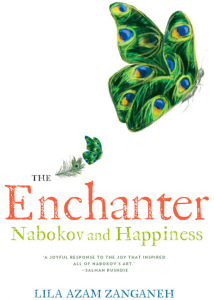Books & Culture
REVIEW: The Enchanter: Nabokov and Happiness by Lila Azam Zanganeh

The Enchanter: Nabokov and Happiness
Lila Azam Zanganeh
W. W. Norton & Co.
228 pp / $23.95
Ladies and gentlemen of the jury, exhibit number one: Lila Azam Zanganeh’s debut book, The Enchanter: Nabokov and Happiness. Look at this pastiche of words.
Born in 1976, in Paris to Iranian émigré parents, Zanganeh assembles a delighting collage of literary criticism, biography, and fiction in this postmodern love letter to Russian writer Vladimir Nabokov. Na-boak-off: the tip of the tongue tapping palate; lips puckering in anticipation; the guttural sigh that follows. Did he become infamous for his lust? He did, indeed he did. You can always count on a grad student for a clichéd paper on Lolita’s ontological paradigm of narrative meta-morality.
A propos: I have wondered why write about happiness? In this Paxil-laden world of bubbles, unicorns, and rainbows, could it be that a simple text, a string of words, can reveal pleasure (jouissance, according to Barthes)? Yes. I learned what this happiness looks like: Zanganeh explains that Nabokov’s happiness is “a singular way of seeing, marveling, and grasping, in other words, netting the light particles tingling around us.” Like butterflies: blue, with a trail of orange eyes along feathery hems, rustling. Not only a sight, but also “an experience in happiness” that Nabokov “awaken[s]” in Zanganeh “more vividly than anyone [she has] ever read.” We see, we feel. A few more words about Nabokovian happiness (a good explication is to happen quite soon): Zanganeh claims this happiness is connected to “an experience of the edge, an experience of the limits […] which becomes one of extreme poetry […] this poetry is bliss:” blazhenstvo. This shimmering bliss — how does Zanganeh obtain it? How can I?
Gentleman of the jury! I can swear that the imaginings — if I may invoke another abstraction — Zanganeh presents extend beyond a rudimentary scholarly thesis, a five paragraph monster of introduction, body, conclusion. No. For Zanganeh, “flashes of [Nabokov’s] memories summon fresh colors; fragments of stories evoke untold stories; sentences cause fitful echoes.” And so, Zanganeh paints these colors, tells these stories, and records these echoes. Jury, open the book and I shall show you how. Zanganeh “interviews” Nabokov, her dear VN. With a single doubt, this interview is a fictionalized account: however, Zanganeh’s perfect-pitch capture of Nabokov’s voice lends her interview an air of authority. I can see him, clutching his copy of Dante’s Inferno, nodding his head slightly to the left as he claims that “America turned out to be less of a prude than her European cousins.”

This is not all. In a chapter titled “A Summary of Six Mad Hatters’ Happiness, Zanganeh delves into Nabokov and love: she introduces readers (you, jury) to Nabokov’s lovers, his wife, and explores the figures of love, or rather lust, in Nabokov’s novels. Zanganeh gravitates through a prism: from broad strokes of Nabokov’s life and fiction to the particular words he utilizes, words that “dazzle and delight, scintillate and sparkle like stars on a see-through night, luminaries of luminescence that lure the eye towards fierce orbs thus far unseen” (this lush prose! this rhythmic alliteration!).
Writing this book, Zanganeh becomes Nabokov critic, novelist, and at times, Nabokov. Through this act of writing, Zanganeh obtains Nabokovian happiness, and not merely through the reading of Nabokov’s texts. You ask me how? Zanganeh creates worlds that Nabokov has built and inhabits them.
This is happiness, jouissance, blazhenstvo (bliss!): the possibility as a reader of a writer to excavate, explore, and re-build that writer’s work,
Jury, this is what I have done.
***
— Bracha Goykadosh received her MA in English Literature from Brooklyn College in 2011. Currently, she is a first-year law student at Benjamin N. Cardozo School of Law. Find her at www.brachagoykadosh.com.









